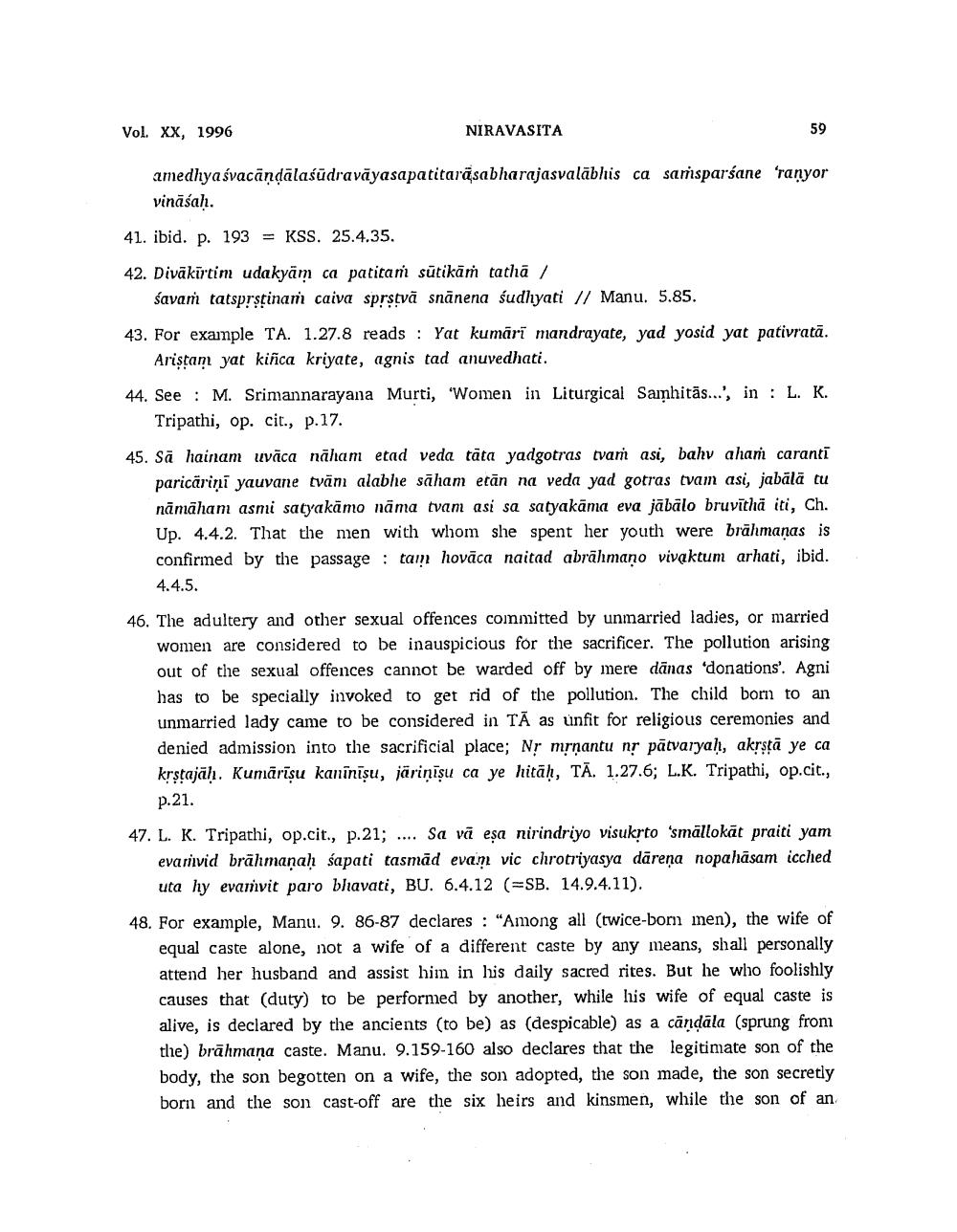________________
Vol. XX, 1996
NIRAVASITA
amedhyaśvacandālaśūdravāyasapatitarāsabharajasvalabhis ca sarsparsane ranyor vināśah.
41. ibid. p. 193 = KSS. 25.4.35.
42. Divākīrtim udakyam ca patitan sütikāṁ tathā /
śavam tatsprstinam caiva sprstvā snanena śudhyati // Manu. 5.85. 43. For example TA. 1.27.8 reads : Yat kumāri mandrayate, yad yosid yat pativratā.
Aristam yat kiñca kriyate, agnis tad anuvedhati. 44. See : M. Srimannarayana Murti, 'Women in Liturgical Samhitās...', in: L. K.
Tripathi, op. cit., p.17. 45. Să hainam uvāca nāham etad veda tāta yadgotras tvam asi, bahv aham carantī
paricāriņi yauvane tvām alabhe sāham etān na veda yad gotras tvam asi, jabālā tu nāmāham asmi satyakāmo nāma tvam asi sa satyakāma eva jābālo bruvīthā iti, Ch. Up. 4.4.2. That the men with whom she spent her youth were brāhmanas is confirmed by the passage : tam hovāca naitad abrāhmaṇo vivaktum arhati, ibid. 4.4.5.
46. The adultery and other sexual offences committed by unmarried ladies, or married
women are considered to be inauspicious for the sacrificer. The pollution arising out of the sexual offences cannot be warded off by mere danas donations'. Agni has to be specially invoked to get rid of the pollution. The child born to an unmarried lady came to be considered in TĀ as unfit for religious ceremonies and denied admission into the sacrificial place; Nr mrņantu nr pātvaryah, akrstā ye ca krstajāh. Kumārīşu kanīnīşu, järinīșu ca ye hitā), TĀ. 1.27.6; L.K. Tripathi, op.cit., p.21.
47. L. K. Tripathi, op.cit., p.21; .... Sa vă eșa nirindriyo visukrto 'smällokāt praiti yam
evarvid brāhmaṇaḥ sapati tasmād evam vic chrotriyasya dāreņa nopahāsam icched
uta hy evanvit paro bhavati, BU. 6.4.12 (=SB. 14.9.4.11). 48. For example, Manu. 9. 86-87 declares : "Among all (twice-bom mnen), the wife of
equal caste alone, not a wife of a different caste by any means, shall personally attend her husband and assist him in his daily sacred rites. But he who foolishly causes that (duty) to be performed by another, while his wife of equal caste is alive, is declared by the ancients (to be) as (despicable) as a candāla (sprung from the) brāhmaṇa caste. Manu. 9.159-160 also declares that the legitimate son of the body, the son begotten on a wife, the son adopted, the son made, the son secretly born and the son cast-off are the six heirs and kinsmen, while the son of an




